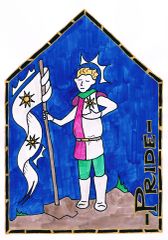Pride
The Path of Pride
"Death is the door of the Labyrinth,
"and I shall walk through it with my head held high.
If any Virtue divides the Nations of the Empire as much as it unites them, it is Pride. The Merchant Prince of Sarvos who wears a ring on every finger and a cloth-of-gold cloak shows her Pride in her people’s way; so too does the Marcher who picks up his bill and inspires all the young men and women of his village to take up arms alongside him. The ways in which the peoples of the Empire show their Pride are as many as their Nations – indeed, the Egregores were created for this very purpose, to help guard the Pride of the people – but Pride itself, and the need for it, is common to all.
The Proud do not boast; when they tell the tales of their great achievements, they recount the truth and inspire others to greatness. The Proud do not think themselves better than those around them; with their frank admission of their flaws, they place their victories in the proper human context. Even when they lead, the Proud know that a leader does not rule their people, but serves them and the Empire.
Pride is built on a bedrock of self-knowledge. A Proud person acts because they are confident in who they are and how they should act. They surround themselves with people who live up to their expectations, seek out opportunities to test their resolve, and they do not compromise for the sake of expediency. The Proud also understand and exalt the value of choice; they do not allow other people or simple circumstances to define who they are and what they are capable of. They take control of their own lives and their own destinies and they go their own way without apology.
The Way of Pride teaches that whatever station a person may choose for themselves, there is always Pride in doing it well. The capable servant who keeps their mistress’ cups clean, the artisan who refuses to cut corners, and the sergeant who remembers the names of every soldier who died under their command – every person who knows what they strive for and commits themselves to doing it right serves the Virtue of Pride.
The Proud do not scoff at the achievements of others; the truly Proud do not exalt themselves at the expense of others. They value respect more than flattery, especially respect that is hard-earned. They eschew prejudice and assumption, and they do not seek to enforce their personal beliefs on others but rather seek to inspire them to embrace the same truths that they hold as self-evident.
Not unlike Ambition, Pride is sometimes considered to have a dark side; the Proud are sometimes characterised as putting themselves "above" their peers. In fact, the Proud often believe that it is not their business what anyone else does; they do not value the approval or disapproval of others. An arrogant citizen may claim their false assumptions to be the result of Pride in their achievements, but if they do not recognise their flaws, if they do not demonstrate their greatness, and if they do not seek to inspire greatness in others, then they show no Pride in themselves, their lives or their people.
Guidance on the Path
Through study of the Paragons and Exemplars, the priests of The Way have gleaned insight into the heart of the Virtue and how best to pursue it. There are collections of parables, tales, sayings and teachings that distill this for Imperial Citizens to learn from. The following are a handful of teachings and sayings deemed to be essential to understanding the Path:
- Pride conveyed by words alone is vain boasting; proclaim it by how you conduct every part of your life.
- Do not be complacent; ever strive for excellence in that of which you are proud.
- Embrace your past; never be ashamed of it.
- The Virtuous inspire others to greatness; they do not demean them.
- Despise the half-hearted, the uncommitted and the pretender.
Paragons and Exemplars
Across history, the Paragons and Exemplars of Pride have been amongst the easiest to identify for they are, by nature, rarely reclusive and withdrawn. Recognised Paragons and Exemplars of Pride include:
- Kethry of the Kesh.
- Lepidus of the Seven Stars Chapter of the Highborn.
- Empress Richilde, third ruler of the Empire, was declared an Exemplar of Pride after her death in 69 YE. The Troubadours of Dawn campaigned extensively to have her recognised as a Paragon, and in 219 YE they succeeded, making her the first paragon recognised in the modern era..
Symbols, icons and trappings
The Priests of Pride teach that the true symbol of the Virtue of Pride is to display openly the symbol of that which you are most proud. Flags, banners, icons and heraldry are all strong symbols and trappings of the Path of Pride but often depict that in which the Priests and Pilgrims have pride. Some wear the symbol of the Sun as a symbol of letting one’s light shine openly for the world to see.
Further Reading
- You can learn about the various spiritual roleplaying effects created by priests dedicated to Pride here.
- You can learn about the skills that priests can use to inspire the virtue of Pride here.
